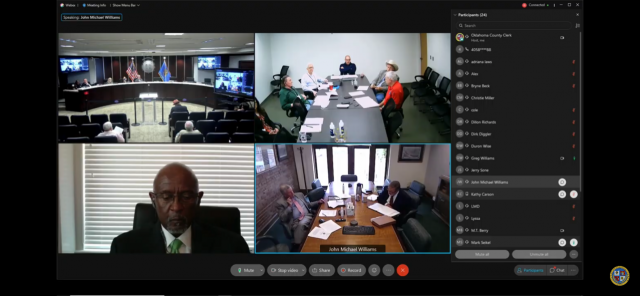
Meetings of the Oklahoma County Criminal Justice Authority, also known as the jail trust, are never boring, as was proved true again in a Monday meeting that was expected to focus on the selection of a new chairperson but became dominated by controversy over public comment at the authority’s meetings.
The trust approved the nomination of former Oklahoma City City Manager Jim Couch as its new chairman by a 9-0 vote. Couch has been a member of the jail trust since its inception last year. He previously served as city manager for 18 years.
But the most heated controversy of Monday’s meeting followed a motion made by trustee Ben Brown that would curb public comment at jail trust meetings.
Since its beginning, the public comment time at trust meetings have featured comments from criminal justice activists which some trustees have found frustrating and disruptive. At one meeting in January, a physical fight broke out.
In September of last year, Brown was called a “racist motherfucker” during a meeting by activist Jess Eddy, though in recent months the meetings have become far less tumultuous.
The issue is not new for Brown. In an interview with NonDoc earlier this year, Brown said he believes the protests have often slowed down the work of reform.
“It’s a slow process anyway, that has frankly been made more difficult by the people who have been crowding into the trust meetings and raising hell,” Brown said earlier this year. “I’ve been really frustrated with them.”
New rules for speakers
The trust passed Brown’s motion by a 7-2 margin, despite objections from several members of the public and questions from two of the trustees.
Trust attorney John Michael Williams said the trust is not currently required to provide time for public comment but has done so anyway. Currently speakers are allotted three minutes to speak on each agenda item.
The new rules would limited a speaker to one agenda item for three minutes at the beginning of the meetings. If that person refuses to stop speaking they could be subject to a misdemeanor charge.
Williams said the policy is in line with a 2016 state law, Title 21 Section 280, that was recently amended by the legislature.
That statute states that those who disrupt, disturb or interfere with state business are subject to criminal penalty.
The statute says, “Any violation of the provisions of this section shall be a misdemeanor punishable by imprisonment in the county jail for a term of not more than one (1) year, by a fine not exceeding One Thousand Dollars ($1,000.00), or by both such fine and imprisonment.”
When asked by trustee M.T. Berry if the trust was in effect creating a new law, Williams said that was not the case.
“It will facilitate the enforcement of laws now on the books,” Williams said.
Activists object to new rules
Criminal justice reform advocate Adriana Laws said limiting comment was the reason meetings last year resulted in disruption.
“We understand that you don’t have to provide public comment, but we would hope you keep public comment going the way that it has been in hopes of fostering trust and open communication between this body and the community,” she said. “If you’re going to allow it once in a meeting maybe we should have more than three minutes. The history of public comments in these meetings is literally the reason why there were disruptions in the first place.”
Laws said she would continue to say what she felt she needed to say.
“I will speak out, and that will be it,” she said. “Arrest me all you want to. Clara Luper was arrested 26 times. Back in her day, she was thought of as a troublemaker, the same way Ben Brown looks at me.”
Activist Jess Eddy said he and others have worked to have more constructive dialogue with the trust in recent months and therefore a new rule isn’t necessary.
“Just move forward with public comment the way it is,” he said.
“We have no intentions of disrupting anything. There’s no need for this.”
Trustee Sue Ann Arnall said she supports the idea of streamlining public speaking during meetings but voted against the motion because it could potentially result in someone being arrested.
“I do agree with limiting the comments, but I don’t agree with what amounts to threats in the resolution,” she said.
Couch elected as trust chairman
In what seemed like a perfunctory move, the trust elected Couch as its new chairman by a 9-0 margin. Couch replaced Tricia Everest, who served as the trust’s first-ever chairperson before resigning that position last month to become Secretary of Public Safety.
Trustee Francie Ekwerekwu asked Couch what his vision was for the trust’s future.
“My vision is to continue to make improvements to the Oklahoma County jail and to make it a more humane, professional operation,” Couch said before the vote.
Ekwerekwu nominated M.T. Berry to be vice-chair, but Berry declined, and instead nominated Brown, who was elected as the trust’s vice-chair.
“My vision is to continue on the road we’re on, and that’s to improve the operation of the Oklahoma County Jail,” he said.
County commissioners select new trust member
At a separate meeting on Monday morning, the Board of Oklahoma County Commissioners appointed Joe Allbaugh to the trust as a regular member.
Allbaugh led FEMA during the early years of George W. Bush’s administration, but was not heading the agency at the time of Hurricane Katrina. He later worked for former New York Mayor Rudy Giuliani during his ill-fated 2008 presidential campaign.
Allbaugh also served as Oklahoma Department of Corrections director for more than three years before his abrupt resignation in 2019.
He was appointed by a 2-1 vote. Commissioners Brian Maughan and Kevin Calvey voted for Allbaugh, though in a moment that proved awkward, Maughan said that Allbaugh had not been his first choice for the position. Commissioner Carrie Blumert voted against the nomination.





















